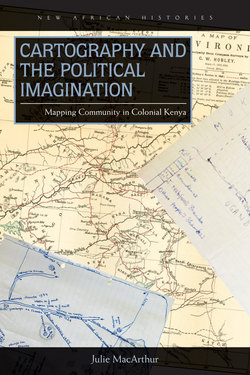Читать книгу Cartography and the Political Imagination - Julie MacArthur - Страница 2
На сайте Литреса книга снята с продажи.
ОглавлениеPraise for Cartography and the Political Imagination
“The Luyia defy assumptions about African ethnicity. With neither myth of common descent nor shared vernacular speech, this modern community is yet no colonial invention. These least ‘tribal’ of Kenya’s peoples mapped their own territory of civic pluralism. In this new departure in ethnic studies, Julie MacArthur persuasively subverts our conventional wisdom.”
—John Lonsdale, Emeritus Professor of Modern African History, University of Cambridge
“Cartography and the Political Imagination breaks new ground in Kenyan historiography with its focus on western Kenya. This detailed and sophisticated study argues that Luyia ethnic architects used cartography to create a demographically inclusive, politically pluralistic, and progressive cosmopolitan community. It is refreshing to read a book on Kenya that does not focus on Mau Mau or the Kikuyu. MacArthur’s exemplary study of a regional history will be indispensable to scholars of ethnogenesis and cartography in Africa and elsewhere.”
—Kenda Mutongi, Williams College
“The Luyia have long represented a potential test case for the limits to the invention of ethnicity. MacArthur’s rich study does not disappoint. It reveals how a series of external influences—land pressures, gender panic, and the drawing of administrative boundaries—led the Luyia to define themselves through appeals to locality rather than shared ancestries. Its most fascinating contribution lies in its treatment of Luyia practices of counter-mapping.”
—Paul Nugent, Centre of African Studies, University of Edinburgh
“MacArthur’s exploration of the historiography of ethnicity in Kenya combines theoretical sophistication with innovative and deftly interdisciplinary methodological work, along with a knack for personalized storytelling. In Cartography and the Political Imagination, MacArthur has knit together a diverse and complex array of actors, plot lines, and forms of evidence (archival, cartographic, oral), resulting in a fascinating and important piece of historical scholarship.”
—Heidi Gengenbach, University of Massachusetts, Boston
